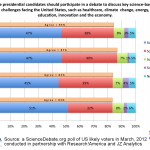Science Debate
Sciencedebate.org has managed a seemingly impossible task. They developed 20 distinct (but often interrelated) questions about science policy, based on vast amounts of public input, and then got all four presidential candidates to address them. Congratulations to Sciencedebate.org. This is important, and I know that was not easy to do. The questions, and answers, are here.
Here are my reactions to the candidates responses for some of the questions.
1. Innovation. Science and engineering have been responsible for over half of the growth of the U.S. economy since WWII. But some reports…
Several dozen nonpartisan organizations have joined together to ask for a Science Debate in the current campaign. The debate would address major issues in science, engineering, health and the environment
This is part of an effort that has been going on for several election cycles, with a certain degree of success.
More than 10 million scientists and engineers are represented by the organizations that have joined in this effort. They have provided a list of twenty major issues, and are encouraging journalists and voters to press the candidates on them during the 2016 U.S. Presidential…
I had previously mentioned the ScienceDebate ad with the kids asking for a science debate. Here is some local coverage on the story (the ad was made here in the Twin Cities) including an interview with one of the stars, Susanlyn Singroy. (I don't agree with everything she said, but what the heck, she's asking for a debate, and is up for it!)
Here is the coverage.
More about ScienceDebate.org here.
We are at war. I do not refer to the war in Afghanastan (though that too) but rather to the war between the religious right, Republicans, the 1% and various anti-science forces on one hand and everybody else on the other. Indeed, it is standard political wisdom that Fundamentalist Christians and Republicans constitute an overlapping (and where not overlapping, highly cooperative) group standing in opposition to science.
Right?
Well, actually, no. New research released literally moments ago suggests that things are a bit more complicated than this. It turns out that generally speaking,…



